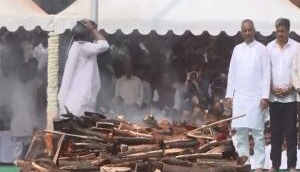Manimanjari Sengupta
| Updated on: 10 February 2017, 1:50 IST

Bengal's foremost literary giant Rabindranath Tagore was so much more than just that. Tagore's genius spilled over considerably into the political realm, and his philosophy added to the momentum of India's struggle for freedom from British colonialism. Tagore was born in a tumultuous time - shortly after the First War of Indian Independence, the Sepoy Mutiny in 1861 - into an upper-caste privileged Bengali family. He found himself at the center of the political upheaval of the late nineteenth century. His works are a reflection of the politics of the time, and the vitality of the age was captured by him in his inimitable way in his plethora of novels, poetry, plays and songs. Tagore's philosophy was as much of a driving force in India's struggle for freedom, as was Gandhi and his vision of an independent India.But the two were at odds with each other in their ideas and their ideologies. While Gandhi was a proponent of revolutionary nationalism, Tagore asserted, that the true essence of independence can be realised not through political freedom, but with freedom of the soul.He was particularly wary of violent public protests, his notion of 'freedom' not restricted to political release from the British. Tagore was especially critical of the Swadeshi Movement, as well as the Non Cooperation Movement. He understood that rejecting everything British was not the only means to combat colonialism. His belief was that the synthesis of everything good in western societies, with that of the East was possible, and could prove to be effective in bringing about societal harmony. While the Swadeshi Movement seemed to be an effective strategy of resistance, it failed to take into account the enormous losses that small traders, mainly Muslims, incurred as a result. This was the premise of his novel Ghare Baire (The Home and the World), where there is the vivid depiction of the plight of the Muslim traders of the time, who are harassed into giving into the public demand to burn their stock of British goods.In his works, he talked about revolution. Tagore's musical adventure Tasher Desh, written in the year 1937 can be understood in the context of the freedom struggle. Freedom to him meant the ability to revel in the rapture of life, knowledge and the soul. In 1933, Tagore, at age 72, was deeply moved by political developments at home and elsewhere in the world.It was the year that Gandhi launched a three-week hunger strike against the mistreatment of the lower castes and was imprisoned twice. In Germany, it was the year of Adolf Hitler's ascension to the position of a dictator and his infamous 'Proclamation to the German Nation'. 'Bandh bhenge dao', Tagore wrote in his dance drama, urging his nation to break all barriers and to bring about a movement rooted in spiritual emancipation.Sugato Bose, while addressing the Lok Sabha on the JNU nationalism debate had expressed concern that in this day and age, Tagore himself might have been hailed as 'anti-national' by those who were lending a narrow definition to Nationalism.Tagore's idea of "freedom" embodied the ability to be honest and truthful with oneself. His patriotism was of a different nature. It manifested into a love for the nation as a being - it's people, rather than one of territories and boundaries.If that isn't nationalism, what is?
First published: 8 May 2016, 5:51 IST








![BJP's Kapil Mishra recreates Shankar Mahadevan’s ‘Breathless’ song to highlight Delhi pollution [WATCH] BJP's Kapil Mishra recreates Shankar Mahadevan’s ‘Breathless’ song to highlight Delhi pollution [WATCH]](https://images.catchnews.com/upload/2022/11/03/kapil-mishra_240884_300x172.png)

![Anupam Kher shares pictures of his toned body on 67th birthday [MUST SEE] Anupam Kher shares pictures of his toned body on 67th birthday [MUST SEE]](https://images.catchnews.com/upload/2022/03/07/Anupam_kher_231145_300x172.jpg)






